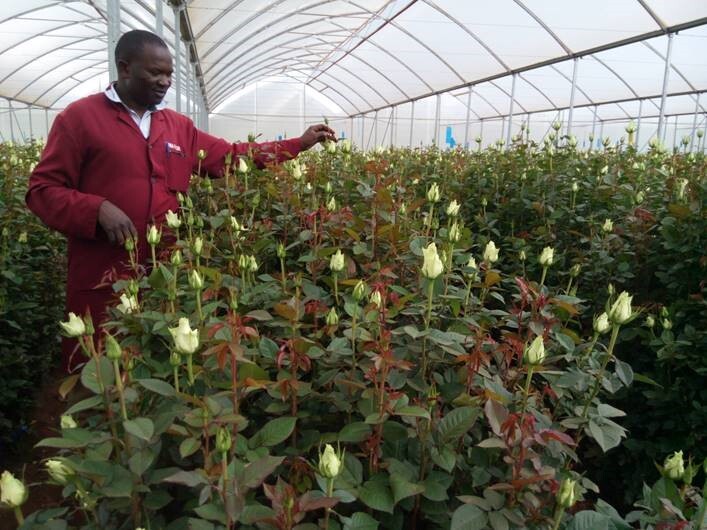
One major headache that flower growers face is the infection of their crops with two important diseases, Downy mildew and Botrytis. These adversely affect the production output and quality of flowers especially roses. With exporters facing stringent measures on pesticide residues and the market leaning towards sustainable growing practices, growers are required to do much more than their usual practice.
Downy mildew manifests itself on the leaves in yellow, green or white patches on the upper surfaces. On the undersides, these areas are covered with white to grayish, cotton-like fungal growth. As the disease progresses, leaves may eventually turn crisp and brown and fall off even though the plant has ample water. The disease also attacks herbs such as chives and basil as well as crops growing on vines such as cucumbers, grapes and passion fruit. Botrytis, or gray mould as it is commonly known, on the other hand, generally attacks above the ground parts including flowers, buds, canes and growing tips. Under favourable conditions, the spots quickly expand into large, brown, irregular blotches covering much of each petal.
These two destructive diseases can cause massive losses in the production of roses, if not properly managed. At the beginning of 2018, Koppert launched and introduced NoPath to the Kenyan market. This is a product based on essential plant oils that is used for the management of fungal and bacterial diseases in various crops. It has preventive, curative and eradicative effects and is safe for humans and the environment. With a wide spectrum anti-microbial and anti-fungal properties, it is used to reduce microbial contamination or infection in plants or plant parts and can also fight soil related diseases.
Since its introduction, NoPath continues to perform well on the Kenyan scene. Current use has demonstrated good control of downy mildew on roses, chives and basil. The product is also effective in the control of rust on beans and carnation, as well as early blight on tomatoes. In crops that are propagated with bulbs such as arabicum, NoPath is used to effectively manage soft rot.
But don’t just take our word for it. Read what some growers shared on their experiences with the product:
“I have used NoPath for a while and gained confidence in the product for two main reasons. First, with consistent and timely application of NoPath, we are assured of acceptable level of control of Downy mildew and Botrytis in our rose crop. In addition, NoPath is quite 'friendly' to the crop because I never experience any stress or shock on the crop after continuous drenching, unlike chemical pesticides. Finally, I value regular and very reliable technical support that I get from the Koppert team" – Kenneth Mbae - The Production Manager, Waridi Ltd
"The type of rose that we grow is inherently susceptible to downy mildew. Since our farm operates under GAPs, NoPath fits well in our integrated Downy mildew management strategy. With NoPath we no longer worry about Downy mildew even in the rainy season" - Godfrey Kahiga, production manager at Tambuzi Ltd.
Conventionally, growers rely on chemical fungicides to manage these diseases with some level of success. This typically involves frequent foliar sprays particularly when humid weather favours these diseases. However, this approach tends to be reactive and not sustainable. A proactive, preventive approach using natural products such as NoPath is preferable. Such a strategy entails management approaches that target all the aspects in the disease triangle. This includes good cultural practices, use of effective products that target many aspects of disease development, timely prophylatic application of products and proper application of the said products.
NoPath is highly recommended for such an integrated management strategy. If correctly used and applied, NoPath can effectively manage the two diseases. Please contact your regional Koppert consultant for more information or write to us on info@koppert.co.ke